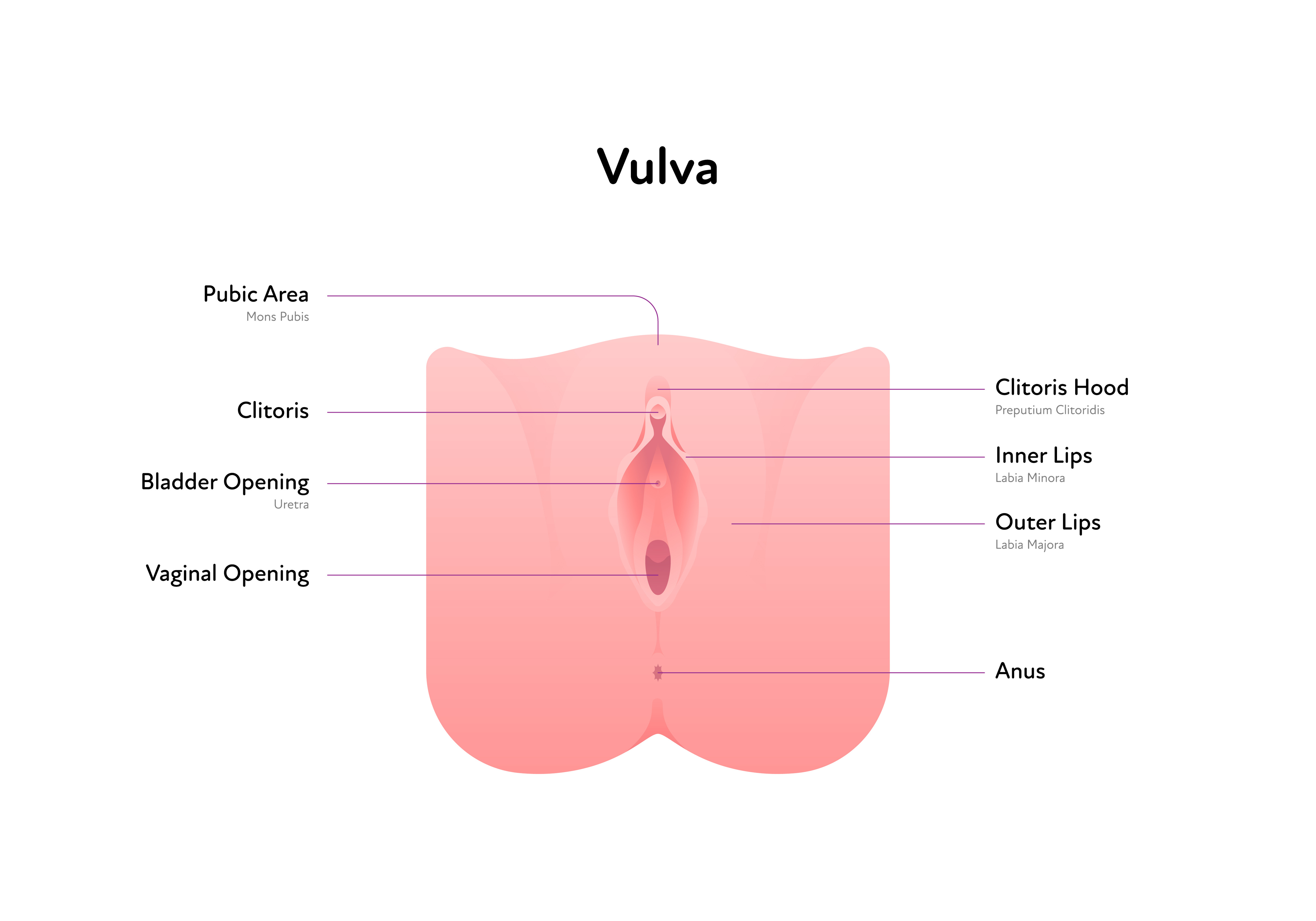My vulva & vagina
People use lots of different names for the female genitals. Let's start by understanding the proper names.
- Vulva. This is the bit you can see on the outside which are often called lips (labia) or flaps. It has 2 parts. The outer lips which are covered in pubic hair and in the inner lips which don't have any pubic hair on them.
- Vagina. This bit you can't easily see. It is the inside part. A tube that starts at the vulva and leads up to the cervix (the entrance to the womb). This is where you bleed from during a period.
- Clitoris. A small bump at the top of the vulva which is very sensitive. It is protected by a hood of skin. It is full of nerves and is there to provide sexual pleasure.
- Urethra. This is a tiny hole between your labia, just above the vagina. This is where you wee from.
It is important to get to know your vulva. Then you will know what is normal for you and it will help you spot if there is a problem like a rash or a lump.
Use a small mirror to have a look at your vulva and see if you can find the other parts listed above.

Am I normal?
Women often worry about how their labia look and whether they are normal. As you go through puberty you will develop pubic hair on the outer lips and the inner lips grow larger. Some women have bigger inner lips than others. Some are symmetrical and some are not. All labia are different but sometimes this isn’t obvious from what we see in magazines, on social media and the internet.
 The Labia Library has pictures of lots of different normal labia. It shows that, just like any other part of the body, labia come in all shapes and sizes. They’re also really important in sex and they keep your vagina healthy.
The Labia Library has pictures of lots of different normal labia. It shows that, just like any other part of the body, labia come in all shapes and sizes. They’re also really important in sex and they keep your vagina healthy.
Discharge
The vagina becomes more acidic after puberty. This helps to protect against infection. Vaginal discharge is completely normal. It stops the vagina from drying out and helps keep it clean and healthy.
Never wash inside the vagina. This washes away all the healthy bacteria and changes the acidity. Then you might get an infection like bacterial vaginosis or thrush.
Get to know what's normal for you and then you will spot if there is a problem. If your discharge changes then you should speak to a doctor, nurse or sexual health clinic. If you have had unprotected sex and your discharge has changed this may be a sign of infection (STI). Visit our STI page for more information.
Looking after your vagina and vulva
Your vagina and vulva are not supposed to smell of perfume and flowers. It's normal to have a faint (not unpleasant) smell to it. It is a sensitive area and needs to be treated kindly.
- Wipe from front to back when you go to the toilet. This stops bacteria from your poo being spread to your genitals.
- Avoid washing the area with soap, shower gel, bubble bath or any perfumed products.
- Wash with a fragrance free moisturiser such as Hydromol, Epaderm or Cetraben cream instead. You can buy these from your local pharmacy. It is safe to use these creams on daily basis.
- Washing with only water can cause dry skin and itching.
- You can also apply these creams to your vulva before getting in the bath or shower. This will protect the area from soaps and shampoos you might use on the rest of your body. Rinse the area when you are finished washing.
- If you have dry vulval skin apply some fragrance free moisturiser before bed.
- Never wash inside the vagina (douching). Washing too much removes your vagina's protective healthy bacteria. It can cause bacterial vaginosis and make your discharge smell fishy. Do not wash more than once a day.
- Avoid vaginal deodorant, vagisil, feminine hygeine products and wipes.
- Don’t remove pubic hair. Pubic hair is there for a reason! It protects us from irritation, dirt and harmful bacteria. Shaving and hair removal products cause damage to your sensitive skin. Hair removal can also leave you more vulnerable to infection.
- Let your vagina and vulva breathe. It likes fresh air so don't wear knickers in bed at night. Try wearing baggy shorts or loose pyjamas instead.
- Don't wear sanitary towels and pantiliners unless you are on your period. They can make you sweaty, sore and irritated if used all the time.
- Wear cotton underwear
- Ideally underwear should be washed with non biological washing liquid rather than powder. Don't use fabric conditioner.
Pubic Hair
Pubic hair is normal. It can be coarse or fine, straight or curly, dark or light. Pubic hair is there for a reason. It protects you from bacteria and reduces friction during sex. Hair removal can cause soreness and ingrown hairs.
Some people like to remove some or all of their pubic hair. Lots of people also choose to leave their pubic hair exactly the way it is. Everyone is different and the way you choose to keep your pubic hair is up to you.
When should I get help?
Speak to your GP, nurse or sexual health clinic if:
- Your discharge has changed and is not normal for you for example it has a bad smell
- You are itchy, sore or have a rash
If you are worried about speaking to a health professional, visit our page on your right to privacy and confidentiality.
Further information
 Read the Brook Vagina and Vulva FAQs
Read the Brook Vagina and Vulva FAQs
Love your Vulva is an interactive platform celebrating vulvas in all their brilliant diversity



